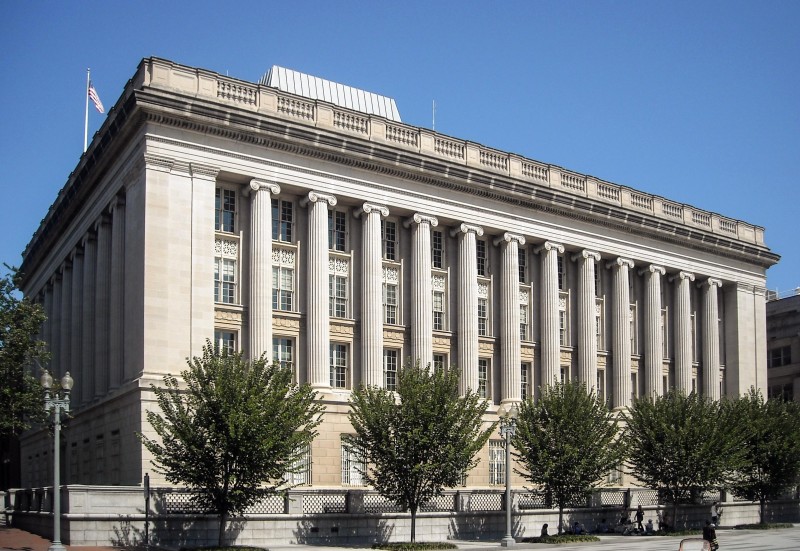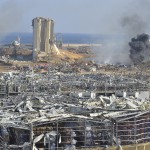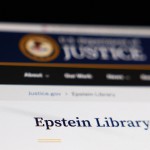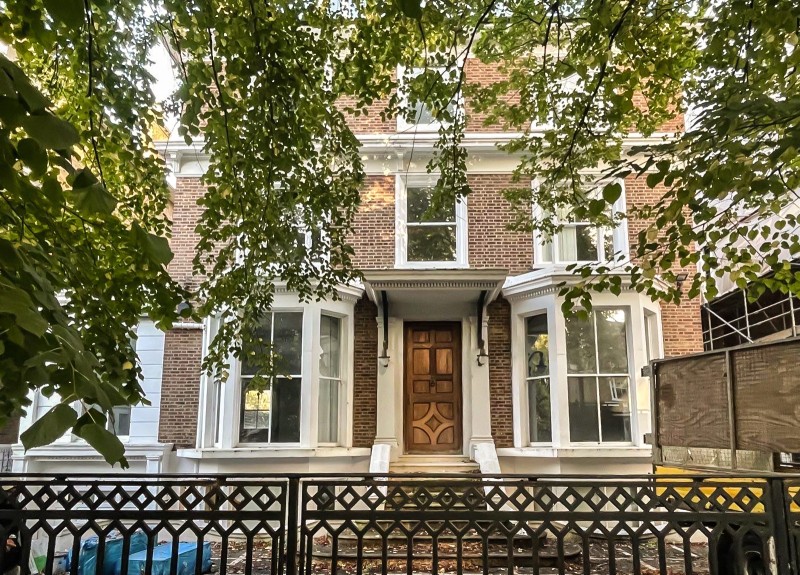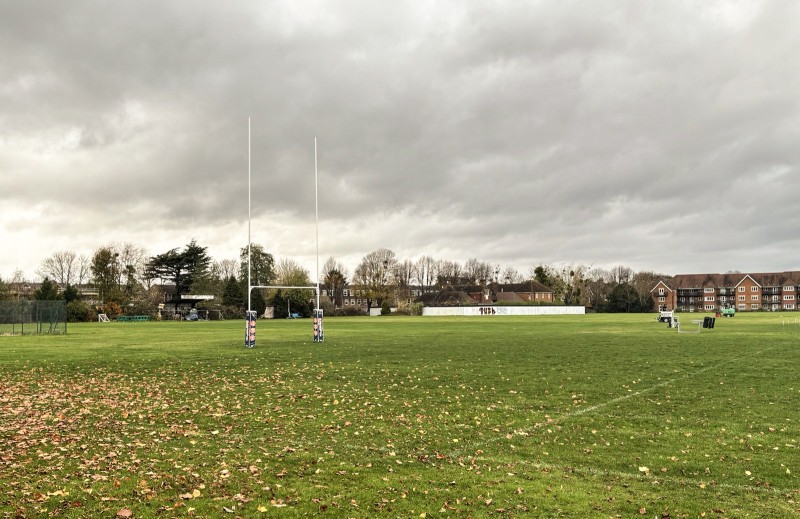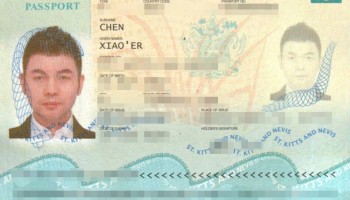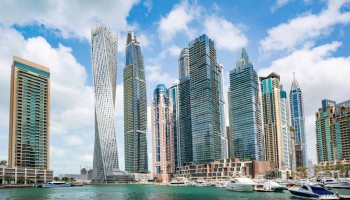Reported by
When the U.S. imposed “sweeping sanctions” recently on a massive Cambodia-based alleged cyber-scam and money laundering network, the name at the top of its alphabetical list of 146 targets was Chen Xiao’er.
But documents show that Chen Xiao’er is actually an alias for Wu An Ming, a 43-year old man of Chinese origin with a passport from the Caribbean island nation of Saint Kitts and Nevis. Records obtained by OCCRP show he first used the passport under the name Chen Xiao’er in 2017, before officially changing it to Wu An Ming by 2020.
Using his current Saint Kitts and Nevis identity, Wu An Ming holds about $45-million worth of property in the U.K., and controls a vast global portfolio of investments that range from listed companies to private jets, OCCRP has discovered.
Corporate records show that he set up a company in the British Virgin Islands (BVI) under his new identity, and used it to buy a former university sports ground, and a property in west London. He also purchased a central London mansion in his own name in 2022, which was partly financed with a mortgage from Citibank, records show.
By that time, the Cambodia-based network, which the U.S. Treasury Department labelled the “Prince Group Transnational Criminal Organization,” had already spent years allegedly leeching billions of dollars from victims around the world.
“Chen Xiao’er” was sanctioned by the U.S. in relation to a company that was developing a luxury resort on an island it leased in the Pacific nation of Palau. Incorporation documents show that a Saint Kitts and Nevis national going by that name set up the company, along with Chen Zhi, the head of the Prince Group.
Wu An Ming did not respond to questions about his multiple identities. His assistant said he was a “long-time acquaintance” of Chen Zhi, but their only business together was in relation to the Palau resort. That project was “unjustly sanctioned,” and Wu An Ming has appealed the sanctions against him, the assistant added.
“Mr. Wu has had no further business cooperation, financial interests, or equity relationship with Mr. Chen Zhi or the Prince Group,” the assistant said in an emailed response to questions. “For many years, Mr. Wu has engaged independently in stock and emerging technology investments, all of which are fully verifiable through lawful documentation.”
The Treasury Department did not respond to a request for comment.
The U.K., which imposed sanctions of its own on the Prince Group in cooperation with the U.S., did not target “Chen Xiao’er” — or his legally-valid name, Wu An Ming.
The U.K. Foreign Commonwealth Office declined to say if authorities were aware of his London properties and multiple identities. The office said in an emailed response to questions that “it doesn't comment on its designations process.”
Victorian Mansion, Rugby Clubhouse
In addition to his stock and tech investments, OCCRP acquired U.K. company and property registry documents showing Wu An Ming’s London real estate holdings.
In March 2022, he purchased a Victorian mansion for 30 million British pounds ($39 million), a stone’s throw from Holland Park, in one of the most expensive residential areas in London. Records show he bought the property in his own name, rather than through a company, and obtained a mortgage from Citibank.
Wu An Ming’s mansion near Holland Park in London.
The new U.S. sanctions could now put Citibank in an awkward position. American companies are forbidden from doing business with sanctioned entities anywhere in the world — which now includes Chen Xiao’er, aka Wu An Ming.
The name confusion doesn’t let U.S. banks off the hook, according to Clif Burns, a lawyer in Washington DC. with Crowell & Moring who specialises in sanctions.
“The U.S. Treasury’s failure to list up-to-date names and nationalities for sanctioned entities does not give banking institutions a free pass to do business with him,” he told OCCRP. “America’s sanctions regime is a strict liability scheme, meaning banks can be punished for even unwitting infractions.”
Citibank did not respond to repeated requests for comment.
A few months after he acquired the Victorian mansion, Wu An Ming used his BVI company, Leisure Focus Limited, to purchase the Imperial College Sports Ground at Udney Park Road, in the upscale London suburb of Teddington, for 3.5 million pounds ($4.6 million).
Reporters found an active rugby pitch at the site, but the clubhouse had been boarded up. The facility had been sold off to an investor, who then sold it to Wu An Ming in 2022.
The Udney Park Imperial College Sports Ground, Teddington, U.K.
In September that year, Leisure Focus also acquired a 10-year leasehold — which provides ownership rights over a given period — for a terraced house in the affluent West London residential district of Maida Vale. That property was valued at 235,00 pounds ($308,000)
The plot is occupied by a small building housing Monet Beauty Clinic, which shares the same name as a clinic in Cambodia owned by a senior executive at Prince Group. Leisure Focus transferred the lease to the clinic in 2023.
Nigel Kushner, a sanctions expert at W Legal in London, pointed out that the U.K. requires people facilitating property transactions to carry out due diligence on their clients.
“Lawyers involved in the conveyancing of large real estate deals are also legally required to check their client is using their real identity and legal sources of funds,” he said.
The Maida Vale property purchased in London by Leisure Focus Limited in 2022.
OCCRP reported last month on another person who was sanctioned by both the U.K. and U.S. for his alleged role in the Prince Group scam operation, and also purchased luxury real estate in London as well as Dubai.
In announcing sanctions against Prince Group and Chen Zhi, the U.K. government said it froze properties, including a mansion worth $16 million and an office building worth $133 million. Authorities also froze 17 apartments that were held by Chen Zhi “and his web of enablers” via companies in the BVI.
The Prince Group has denied any involvement in illegal activity, saying in a November 11 statement: “The recent allegations are baseless and appear aimed at justifying the unlawful seizure of assets worth billions of dollars.”
However, U.K. authorities alleged that some of the profits from scams allegedly run by the Prince Group have been funneled into real estate. The U.K. and the U.S. also noted that scammers are often victims themselves, lured by promises of legitimate employment and then forced to work in guarded compounds under threat of violence.
“The masterminds behind these horrific scam centres are ruining the lives of vulnerable people and buying up London homes to store their money,” Foreign Secretary Yvette Cooper said in the government’s October 14 statement.
Global Business Empire
Aside from Leisure Focus Limited — which he used to buy U.K. properties — Wu An Ming has a separate BVI company called Future King Inc. This firm was incorporated in February 2017 and is key to his international business operations.
Through Future King Inc., Wu An Ming is the beneficial owner of at least two Hong Kong-based asset management firms: China Reserve Securities Ltd, which is licensed by the Hong Kong Securities & Futures Commission, and Future Wing Financial Company Ltd. Both firms occupy the same Hong Kong addresses.
Records show Future King acquired China Reserve Securities in December 2018. In its first annual return under Future King ownership, China Reserve Securities filed a registered share capital of 238 million Hong Kong Dollars ($30 million).
In an emailed response to questions, China Reserve Securities said it “does not represent Mr. Wu personally.”
“Although Mr. Wu is both a shareholder and director, he does not participate in daily operations nor does he have a regular presence at the Company,” China Reserve Securities added.
Future King Inc. has also been a stockholder in Nanomix Corp, a Nasdaq-listed medical company that markets tests to detect or monitor diseases.
In August 2025, Future King acquired a portion of shares in Boyaa Interactive International Limited, a Hong Kong-listed company active in online gaming and cryptocurrencies, which currently holds over $400 million in Bitcoin reserves.
Future King Inc. has also been a shareholder in HyalRoute Communication Group Limited, a Singapore-based company that specializes in developing fiber optic networks.
Additionally, Hong Kong and mainland Chinese company registries show Future King Inc. owning a chain of aircraft leasing companies. Some of the planes are registered in the U.S. and fly routes across Asia.
Several jets were leased to Cambodia Airways, a commercial airline that —as Radio Free Asia reported — was described by its communications officer as being part of the Prince Group.
And there is Grand Legend International Asset Management Co., Ltd., the company Wu An Ming and Chen Zhi used to develop the resort in Palau — which led to the U.S. sanctions against him.
“In view of the need for construction expertise for the renovation of several villas intended for private use and occasional leasing, the company partnered with Mr. Chen Zhi, who had experience in overseas real estate development,” Wu An Ming’s assistant said. “This cooperation gave rise to an equity relationship strictly limited to this project.”
NOTE: This story has been updated to more accurately reflect comments by Clif Burns an the sanctions obligations of U.S. banks.
